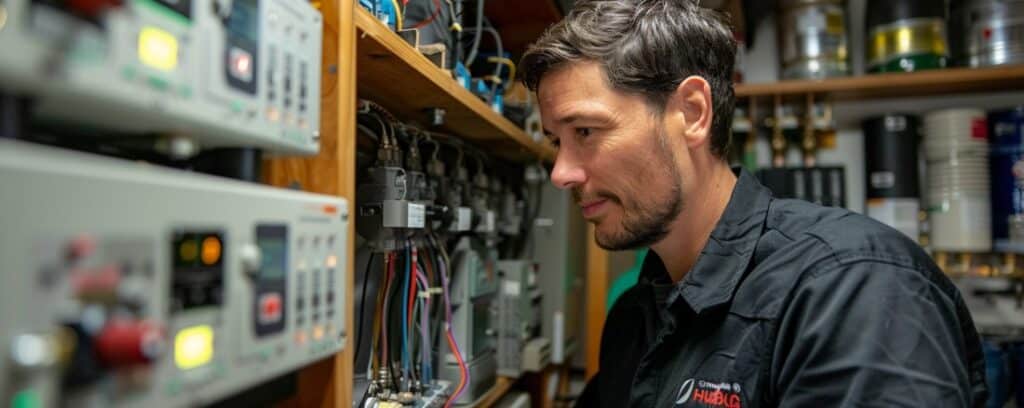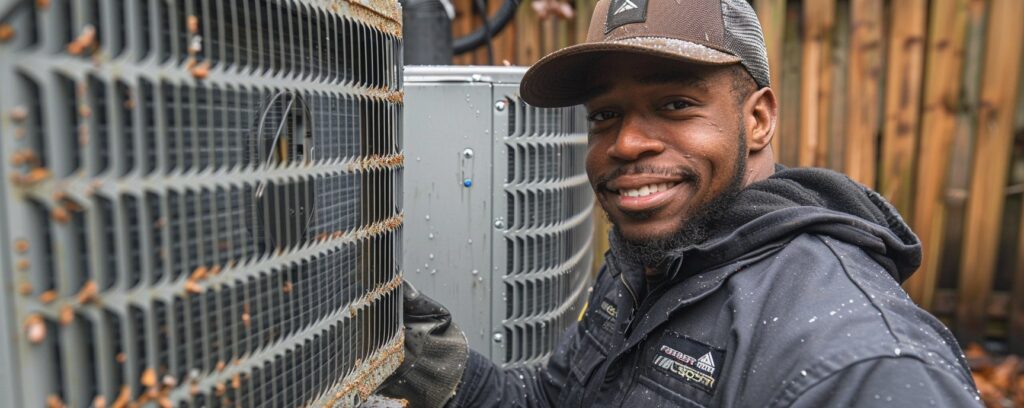- Post-Secondary HVAC Training
- Personal Commitment and Pace
- Program Structures and Offerings
- Availability of Apprenticeships
- Geographic Location
- Intensive Training Programs or Boot Camps
- Online Courses and Self-Study
- Benefits of Fast-Track Options
- Potential Downsides
- Core HVAC Technician Roles
- Specialized Roles and Their Influence on Timeline
- Career Advancements
- The Role of Continuous Certifications
- Renewing Licenses
- The Value of Workshops and Seminars
- Job Stability and Demand
- Competitive Compensation
- Professional Independence
- Job Satisfaction
- Climatic Demand
- Urban vs. Rural Settings
- Local Building Codes and Regulations
- Career Opportunities Based on Geography
- Industry Associations
- Certification Bodies
In an age where climate control is paramount for both comfort and health, the HVAC industry is booming. For those considering a career as an HVAC technician, a crucial question often arises: “How long does it take to become an HVAC technician?” This article aims to break down the timeline, from the first steps in education to the moment you’re ready to handle HVAC systems independently.
The Journey to Becoming an HVAC Technician: A Timeline
Becoming a competent HVAC technician involves a combination of formal education, hands-on training, and industry certification. Let’s delve into each stage to understand the time investment required.
High School or GED
-
Duration: 3-4 years (if starting from 9th grade) or shorter duration for GED.
-
A high school diploma or its equivalent is the basic educational foundation for any HVAC career. During these years, courses in mathematics, physics, and technical drawing can offer a helpful foundation.
Post-Secondary HVAC Training
This phase is where the aspiring technician dives deep into the technicalities of HVAC systems. It also answers a common question: “how long is hvac school?”
Diploma Programs
-
Duration: 6-12 months.
-
These programs provide foundational knowledge about HVAC systems, tools, and installation techniques.
Certificate Programs
-
Duration: Typically 6 months to 1 year.
-
Short-term programs that focus on specific HVAC topics and skills, helping students specialize in particular areas.
Associate Degree Programs
-
Duration: 2 years.
-
A more comprehensive program that covers a broad range of HVAC topics, often combined with general education courses, providing a well-rounded understanding.
While the exact duration can vary based on the institution and the individual’s pace, these programs ensure that students are well-prepared with both theoretical knowledge and practical skills before they step into the professional world.
Why the Duration Varies
Each individual’s journey to becoming an HVAC technician is unique, and the time taken can vary for numerous reasons. Understanding these variables can help aspiring technicians set realistic expectations and make informed decisions.
Personal Commitment and Pace
-
Full-Time vs. Part-Time Schooling: Some may opt for full-time studies, speeding up their education, while others might choose part-time due to other commitments, extending the duration.
-
Hands-on Experience: The speed at which one gains practical experience can differ. Some may quickly land apprenticeships or internships, while others might take longer to get such opportunities.
Program Structures and Offerings
Different educational institutions and training centers have varying program structures, durations, and specializations. Some might offer accelerated courses, while others may have extended curricula with in-depth training.
Availability of Apprenticeships
Entering an apprenticeship can sometimes involve waiting periods, especially if there are more applicants than available positions. The duration of apprenticeships can also differ based on the employer or union offering them.
Geographic Location
Depending on the region or state, there might be specific requirements or licensing processes that could influence the timeline. Moreover, the availability of quality HVAC schools and training centers can vary based on location.
Is There a Fast-Track Option?
For those eager to jumpstart their HVAC careers, there are options to expedite the process, but it’s essential to weigh the pros and cons of such pathways.
Intensive Training Programs or Boot Camps
-
Duration: Varies, but typically shorter than traditional programs.
-
These are accelerated courses designed to impart essential HVAC skills in a condensed timeframe. While they can be efficient, they might not offer the depth of longer-term programs.
Online Courses and Self-Study
-
Duration: Self-paced, can be quicker than in-person programs.
-
With the rise of digital education, there are online HVAC courses available. These allow for flexible learning but might lack hands-on training components.
Benefits of Fast-Track Options
-
Quicker Entry into the Job Market: Reducing education time means you can start working and earning sooner.
-
Flexibility: Especially with online options, learning can be more adaptable to individual schedules.
Potential Downsides
-
Possibly Less Comprehensive: While fast-track options cover the essentials, they might lack the depth of traditional programs.
-
Less Hands-On Experience: Practical skills are crucial in HVAC work, and accelerated programs might not offer as much hands-on training.
Career Options and Specializations
Upon becoming an HVAC technician, the field unfolds to offer myriad pathways tailored to individual preferences and strengths. Here, we explore how different specializations might influence the overall timeline and what opportunities they present.
Core HVAC Technician Roles
- General HVAC Technician: The foundational role, focusing on the installation, maintenance, and repair of standard heating, ventilation, and air conditioning systems.
Specialized Roles and Their Influence on Timeline
-
Refrigeration Technician: Specializing in refrigeration systems, this role might require additional certification and training, potentially extending the timeline.
-
Solar Heating Technician: With a growing emphasis on renewable energy, specializing in solar heating is becoming more popular. This might entail specialized training courses and certifications.
-
Radiant Heating and Geothermal Systems Technician: These are specialized systems that require specific knowledge. Pursuing this path might add to the initial HVAC training duration due to specialized courses or certifications.
Career Advancements
-
HVAC Manager or Supervisor: With experience, technicians can move up to supervisory roles, overseeing teams and projects.
-
HVAC Consultant or Designer: Those with an aptitude for design and innovation can shift towards creating customized HVAC solutions or consulting on large projects.
-
Business Owner: Some technicians might decide to launch their own HVAC businesses, which might involve additional training or courses in business management.
Licensing, Certification, and Continuous Learning
Once you’ve embarked on an HVAC career, the journey of learning and growth doesn’t stop. Staying updated and continuously enhancing your skills is pivotal in this ever-evolving field.
The Role of Continuous Certifications
-
Staying Updated: With technology and regulations continuously evolving, new certifications emerge to validate technicians’ expertise in the latest industry standards.
-
Specialized Certifications: As mentioned earlier, diving into niches like solar or geothermal systems might require specialized certifications.
Renewing Licenses
-
Periodic Renewals: Most state licenses need to be renewed periodically, which might involve additional courses, exams, or fees.
-
Staying Informed on State Regulations: Changes in state regulations can influence licensing requirements. Regularly checking with the state’s contractor licensing board ensures compliance.
The Value of Workshops and Seminars
-
Networking: Attending industry workshops and seminars provides opportunities to connect with peers, suppliers, and industry leaders.
-
Learning About Industry Trends: Such events are a goldmine for information on emerging technologies, best practices, and market trends.
Benefits of Investing Time in HVAC Training
While the journey to becoming an HVAC technician involves significant time and dedication, the investment yields substantial rewards. Here’s an exploration of the benefits that come with comprehensive training in the HVAC realm:
Job Stability and Demand
-
Ever-present Need: Regardless of economic conditions, there’s always a need for heating in winters, cooling in summers, and ventilation for air quality, ensuring consistent demand for HVAC services.
-
Growth Opportunities: With the rise of energy-efficient systems and smart technology, the HVAC industry is poised for growth, offering numerous job opportunities for trained professionals.
Competitive Compensation
-
Higher Earnings with Experience: As technicians gain more experience and certifications, their earning potential typically increases.
-
Additional Benefits: Many employers offer perks such as health insurance, retirement plans, and performance bonuses.
Professional Independence
-
Freelancing Opportunities: Skilled technicians have the freedom to take on independent contracts or freelance assignments, allowing for flexible work schedules.
-
Business Ventures: With experience and industry knowledge, some technicians might even launch their own HVAC businesses, capitalizing on local market demands.
Job Satisfaction
-
Tangible Impact: There’s a profound sense of accomplishment in knowing that your work directly impacts people’s comfort and well-being.
-
Varied Work Environments: HVAC technicians aren’t confined to desk jobs. They work in various settings, from residential homes to large commercial buildings, ensuring no two days are entirely alike.
Embarking on a journey to become an HVAC technician is an endeavor of both time and commitment. From the foundational stages of education to continuous learning in the field, the timeline can vary based on individual choices and opportunities. While it’s essential to understand the time investment, it’s equally crucial to recognize the vast rewards awaiting at the end of the journey. With a stable job market, competitive compensation, and the chance to make a tangible difference in people’s lives, the HVAC profession stands as a testament to the adage that good things come to those who wait—and in this case, to those who invest their time wisely.
Geographic Location and Its Influence on HVAC Careers
The geographic location in which an HVAC technician operates can have a significant influence on demand, career options, and even the specific knowledge required. Let’s delve deeper into how geography plays a role in shaping an HVAC technician’s career:
Climatic Demand
The primary function of HVAC systems is to provide heating, cooling, and ventilation based on climatic needs. As such, the local climate has a direct influence on HVAC demand:
-
Colder Regions: Areas with long, harsh winters, such as the northern parts of the U.S., Canada, or certain European regions, will have a higher demand for heating solutions. Technicians in these areas might need to specialize in advanced heating systems, boiler maintenance, or other technologies tailored for cold climates.
-
Hotter Regions: Places with scorching summers, like the southwestern U.S., Middle East, or parts of Africa and Australia, will see a surge in the need for efficient cooling systems. HVAC professionals in these locations might deal more with air conditioning installations, maintenance, and the latest cooling technologies.
-
Humid Areas: Locations with high humidity levels, such as coastal regions or tropical areas, might have a particular demand for systems that efficiently manage both cooling and dehumidification. This can involve specialized HVAC systems that cater to such specific needs.
Urban vs. Rural Settings
The setting in which an HVAC technician operates can also shape their career:
-
Urban Settings: In bustling cities with high-rise buildings, there’s a demand for complex HVAC systems that cater to large populations in confined spaces. Technicians might also encounter challenges like restricted installation spaces or the need for noise-reduced systems.
-
Rural Settings: In less densely populated areas, HVAC needs might be more straightforward, focusing on individual homes or smaller buildings. However, technicians might need a broader skill set, handling a wide range of tasks from installations to repairs and maintenance.
Local Building Codes and Regulations
Different regions might have specific building codes, regulations, and energy efficiency standards that HVAC systems must adhere to:
-
Energy Efficiency Regulations: Some areas, especially those focused on sustainability, might have stringent energy efficiency requirements. HVAC technicians must be well-versed in these standards to ensure compliant installations.
-
Safety and Building Codes: Local safety standards can influence the type of HVAC systems installed, their placements, and even ventilation requirements.
Career Opportunities Based on Geography
Geography can open doors to specialized career opportunities for HVAC technicians:
-
Coastal Areas: These might have a demand for corrosion-resistant HVAC systems due to salt in the air, leading to specialized roles focusing on such installations.
-
Mountainous Regions: Altitude can affect the efficiency and functioning of HVAC systems. Technicians in high-altitude areas might need to consider these factors when installing or maintaining systems.
-
Disaster-prone Areas: In areas prone to natural disasters like hurricanes, floods, or earthquakes, HVAC systems might need to be designed or retrofitted to withstand such events, creating specialized roles for technicians.
In essence, geography shapes the demand, challenges, and opportunities in the HVAC field. By understanding the nuances of their operating region, HVAC technicians can tailor their skills and expertise to meet local needs, ensuring a rewarding and impactful career.
Additional Resources
As you contemplate or commence your journey into the HVAC realm, a wealth of resources is available to offer further insights, training opportunities, and industry updates. Leveraging these can help you navigate your path with greater clarity and confidence.
Industry Associations
Stay connected with industry trends, and access valuable resources through:
-
Air Conditioning Contractors of America (ACCA) : An influential body that provides resources, training, and networking opportunities.
-
Plumbing-Heating-Cooling Contractors Association : A platform offering insights, education, and connections for HVAC professionals.
-
Refrigeration Service Engineers Society (RSES) : Focused on enhancing the technical competence of HVACR professionals.
Certification Bodies
Boost your marketability and credibility with certifications from recognized bodies:
- North American Technician Excellence (NATE) : A leading certification body in the HVAC industry, offering various specialization options.
Embarking on a career as an HVAC technician is both a commitment and an exciting journey into a world of technology, comfort, and service. With the resources listed above and the insights provided in this article, you’re well-equipped to navigate the path ahead. Whether you’re just starting or looking to elevate your existing career, remember that every step, every certification, and every hour of training takes you closer to mastery in the HVAC domain.




